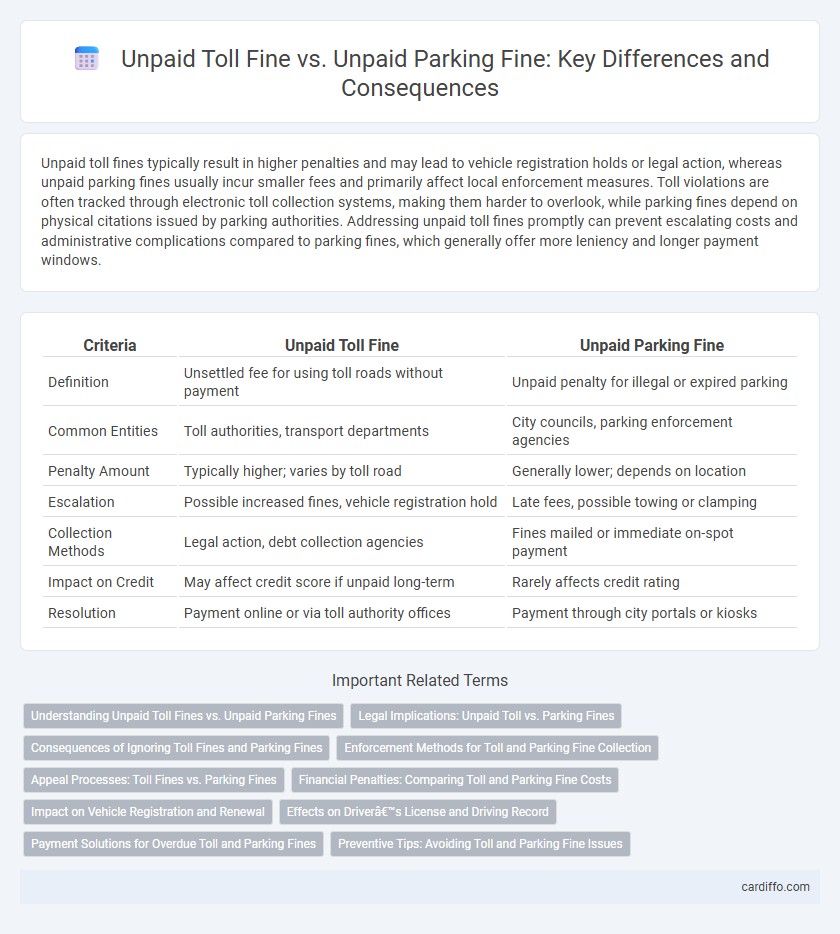Unpaid toll fines typically result in higher penalties and may lead to vehicle registration holds or legal action, whereas unpaid parking fines usually incur smaller fees and primarily affect local enforcement measures. Toll violations are often tracked through electronic toll collection systems, making them harder to overlook, while parking fines depend on physical citations issued by parking authorities. Addressing unpaid toll fines promptly can prevent escalating costs and administrative complications compared to parking fines, which generally offer more leniency and longer payment windows.
Table of Comparison
| Criteria | Unpaid Toll Fine | Unpaid Parking Fine |
|---|---|---|
| Definition | Unsettled fee for using toll roads without payment | Unpaid penalty for illegal or expired parking |
| Common Entities | Toll authorities, transport departments | City councils, parking enforcement agencies |
| Penalty Amount | Typically higher; varies by toll road | Generally lower; depends on location |
| Escalation | Possible increased fines, vehicle registration hold | Late fees, possible towing or clamping |
| Collection Methods | Legal action, debt collection agencies | Fines mailed or immediate on-spot payment |
| Impact on Credit | May affect credit score if unpaid long-term | Rarely affects credit rating |
| Resolution | Payment online or via toll authority offices | Payment through city portals or kiosks |
Understanding Unpaid Toll Fines vs. Unpaid Parking Fines
Unpaid toll fines typically result from failing to pay automated toll charges on highways or bridges, often triggering escalating penalties and vehicle registration holds. Unpaid parking fines usually arise from violations like overstaying limits or illegal parking, with consequences including additional fees and potential vehicle towing. Both types of unpaid fines impact credit scores and legal standing, making timely resolution critical to avoid amplified financial and legal repercussions.
Legal Implications: Unpaid Toll vs. Parking Fines
Unpaid toll fines often carry stricter legal implications, including increased penalties, vehicle registration holds, and potential court actions, whereas unpaid parking fines typically result in escalating fees and may lead to towing or booting but less frequently involve criminal charges. Toll authorities use automated enforcement systems linked to vehicle licensing databases, accelerating legal actions and enforcement. In contrast, unpaid parking fines usually involve municipal agencies with localized enforcement protocols, making toll violations more likely to trigger severe legal consequences nationwide.
Consequences of Ignoring Toll Fines and Parking Fines
Ignoring unpaid toll fines often leads to increased penalties, vehicle registration holds, and potential legal action, while unpaid parking fines can result in towing, booting, and escalating fees. Toll authorities may report violations to credit agencies, negatively impacting credit scores, whereas parking violations primarily affect local enforcement records. Both unpaid fines contribute to administrative costs and can restrict vehicle usage until resolved.
Enforcement Methods for Toll and Parking Fine Collection
Enforcement methods for unpaid toll fines typically involve automated license plate recognition (ALPR) systems and electronic billing, allowing toll authorities to issue fines without physical stops. In contrast, unpaid parking fines often require manual enforcement through parking wardens and the issuance of physical tickets or letters before escalating to booting or towing. Both systems employ vehicle registration holds or credit score impacts as secondary enforcement measures to ensure fine collection compliance.
Appeal Processes: Toll Fines vs. Parking Fines
Unpaid toll fines often require appeals to be submitted through designated electronic portals or toll agency websites, emphasizing evidence such as transponder malfunctions or incorrect vehicle information. Parking fine appeals generally involve contacting local municipal offices or parking authorities, where individuals can dispute violations based on signage clarity or extenuating circumstances. Differences in appeal deadlines and documentation requirements highlight the importance of understanding specific procedural rules for toll versus parking fine disputes.
Financial Penalties: Comparing Toll and Parking Fine Costs
Unpaid toll fines often incur higher financial penalties than unpaid parking fines due to automated enforcement systems and escalating fees for repeated violations. Toll violations can result in costs that exceed the original toll amount by several times, sometimes including administrative fees upwards of $50 to $100. Unpaid parking fines typically have lower base fines, generally ranging from $25 to $75, with gradual late fees but fewer additional surcharges compared to toll penalties.
Impact on Vehicle Registration and Renewal
Unpaid toll fines can lead to holds on vehicle registration and prevent renewal until the fines are paid, causing delays and additional fees. Unpaid parking fines may also result in registration blocks, though some jurisdictions impose these penalties only after repeated violations or extended delinquency. Both types of unpaid fines create administrative barriers affecting vehicle legality and usability.
Effects on Driver’s License and Driving Record
Unpaid toll fines typically result in penalties that do not directly impact a driver's license status or driving record, although persistent nonpayment may lead to vehicle registration holds or increased fines. In contrast, unpaid parking fines generally do not affect driving records or licenses but can lead to vehicle immobilization or booting if left unresolved. Both types of fines can escalate in severity, but only unpaid toll fines carry a higher risk of administrative actions affecting a driver's legal ability to register or operate a vehicle.
Payment Solutions for Overdue Toll and Parking Fines
Payment solutions for overdue toll and parking fines often include online portals, mobile apps, and automated phone systems that facilitate quick and secure transactions. Many jurisdictions offer installment plans or penalty reductions when fines are paid promptly through authorized platforms. Utilizing electronic payment methods accelerates clearance of unpaid toll and parking fines, reducing the risk of added penalties or legal action.
Preventive Tips: Avoiding Toll and Parking Fine Issues
To prevent unpaid toll fines, always use electronic toll payment systems like E-ZPass or maintain sufficient balance in prepaid accounts to avoid violations. For parking fines, carefully review posted signs for time limits and payment requirements, and use parking apps to monitor and extend meter time remotely. Regularly tracking toll and parking accounts online ensures timely payments and alerts, minimizing the risk of fines.
unpaid toll fine vs unpaid parking fine Infographic

 cardiffo.com
cardiffo.com